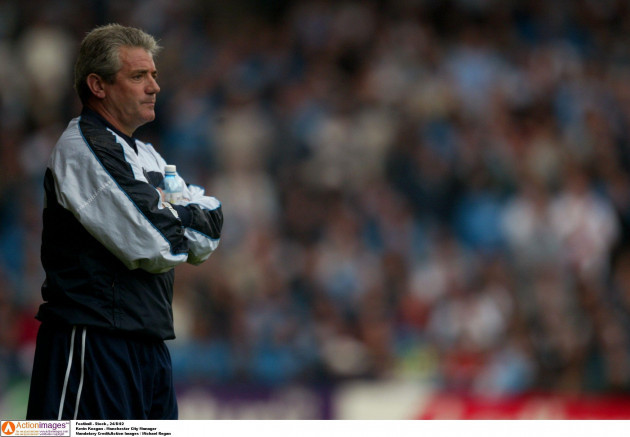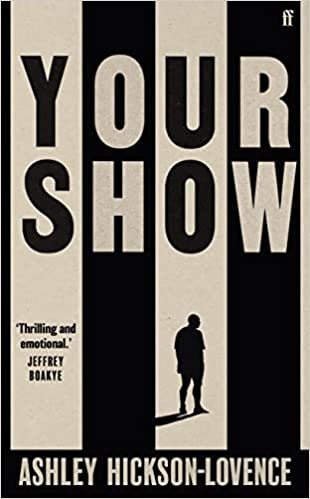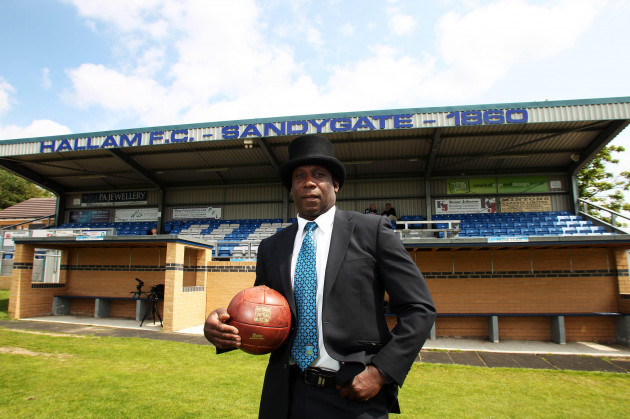‘YOUR SHOW,’ a book about the life of former Premier League referee Uriah Rennie, opens with a memorable quote from Kevin Keegan.
“People should write about Uriah Rennie because that’s what he wants,” the Newcastle legend once said.
The words were obviously said angrily after the former manager was unimpressed with a particular performance by the official, and as well as being cleverly self-referential, it also neatly sets up one recurring theme in the book.
“As I was writing this, the more contentious matches that Uriah was involved in, rightly or wrongly, seemed to involve Newcastle United games,” author Ashley Hickson-Lovence tells The42.
“In fact, that quote wasn’t taken from Kevin Keegan as Newcastle United manager. It was actually when he was at Man City. But it seemed to fit anyway. The novel for a large part focuses on the dynamic of Uriah managing really tough games involving Newcastle United and how perceptions of him in certain circles of the Newcastle fanbase varied and probably got incrementally more detrimental.
“I was trying to show that there was no rift, there was no hatred of Newcastle United. If that was the case, he wouldn’t have been given the games.
“It was a very fitting narrative ploy to try to focus on his relationship with Newcastle United as a club, as a city and certain players like Emre [Belözoğlu], Michael Owen or Alan Shearer because something quite dramatic always happened.”
‘Your Show’ is not a straightforward biography nor is it a novel in the conventional sense, it is really a mixture of both.
Perhaps the aptest comparison is with David Peace’s work and in particular, his football books — ‘The Damned United’ and ‘Red or Dead’ — where the lines between fact and fiction are invariably blurred.
Peace even provides a blurb for the book, hailing it as “rich in both poetry and detail” and Hickson-Lovence acknowledges his fellow author was one inspiration in writing it.
However, a key difference between ‘Your Show’ and Peace’s books is that the person being fictionalised in this instance had some influence over the finished product, whereas Brian Clough and Bill Shankly were no longer alive when the aforementioned novels were published.
“I had more YouTube clips to work with, more matchday programmes to explore and read,” he explains. “And obviously I had Uriah himself to speak with when I needed to, which wasn’t very often. We met about four or five times.
“So with this book, there’s a bit more fact perhaps than your average novel, but that being said, I do use creative licence to try to make it a really good read.”
Hickson-Lovence was also, in some respects, writing about himself. In 2007, aged just 16, he qualified as a football referee and continued in this role for over 10 years.
“It was, without a doubt, one of the best things I’ve ever done. I was quite a shy teenager and it gave me so much confidence.
“Even now, I would happily referee two rival teams in the middle of nowhere because I love the thrill of trying to keep the game flowing, I love how you can communicate with players, you have to use every tool at your disposal to keep the game under your control. You always have to be on your toes and I love that, it’s thrilling, it gets your heart going — in many ways I miss it, and in many ways, I don’t.
“It made me a more well-rounded person because it made me deal with difficult situations, think on my feet, think fast, communicate with all types of people and it allowed me to keep fit as well.
“But you’ve got to approach refereeing with a really thick skin. I was quite young and I was doing quite well, getting quite high up and doing quite good games, but I was having a bad game one time and a guy said to me: ‘Ref, stop trying to be everyone’s friend.’ That really stuck with me because he was absolutely right. You can’t please everybody.”
While many of his peers grew up watching Match of the Day and being inspired by the likes of Wayne Rooney and Thierry Henry, Hickson-Lovence found himself drawn to Rennie most of all.
The author dreamed of following in the footsteps of his idol and made some progress in that regard.
“I refereed at semi-professional level — a few hundred fans at stadiums in and around London, in surrounding counties et cetera. So this very much draws on what it was like walking out, trying to manage difficult situations in terms of players, managers, sometimes getting feedback on your performances on Twitter. So I would say the novel very much draws on my own experiences being a black man but also being a black football referee.
“I stopped refereeing in 2018 but I’m still very much involved in the refereeing circles here where I’m based in the East of England. Refereeing was something that I took very seriously, I prepared for it and wanted to go quite high up.
“By a combination of personal reasons but also the rigidity of the systems in relation to how difficult it can be as a referee of colour to break free of those glass ceilings, it never happened.”
Rather than being told chronologically, ‘Your Show’ jumps back and forth in time, documenting both Rennie’s younger days and some of his more memorable experiences as a referee.
“It definitely wasn’t an easy upbringing. He grew up in a place called Wybourn in Sheffield, quite a large, working-class community.
“Even though it was pretty rough and there wasn’t a lot of money flying about and there was low-level crime et cetera, I think Uri would say it was a place that was full of love. A loving family, a big family, and it sort of helped shape him to become the man that he became — law-abiding, fierce, a stickler for the rules and just fearless.
“When you do grow up in a place like Wybourn and you’ve got rival schools around the corner, you’ve got unscrupulous characters at times in the area et cetera, you’ve got to be of a certain character to survive really and I think he took that on to the football field.”
He continues: “In relation to race, in particular, it would have been really tough. Sheffield was going through some major changes historically. Industrialisation was on the decline. Margaret Thatcher was soon to be in power.
“It was a very difficult time if you were a white man, but an even more difficult, I would imagine, if you were a young black man trying to be taken seriously, trying to survive, trying to help your family in any way that you can.
“He was always involved in sport and sport was an important way for him to find an escape in so many ways.”
The tough times did not necessarily end when Rennie made it as far as the Premier League, or the Premiership as it was known back then.
Hickson-Lovence agrees when I put it to him that, as the first-ever black official to reach that level, Rennie received more scrutiny and criticism than his white counterparts.
He was, however, mostly acclaimed amid his first season in the division in 1997.
“It was the same year that the Labour Party got in power, so things were on the up, but it was a very different world back then. And being a big, tall, black man, a black belt in martial arts would have brought attention no doubt and with that attention comes increased scrutiny.
“His first season as a Premiership referee, he was commended and admired by huge sections of football fans across the country. He was a breath of fresh air.
“Then, there was the argument that he went a bit too strict in the second year — I don’t know if that is true. But when you make such a good impression, to begin with, it’s really hard to maintain that momentum and that consistency sometimes.
“A couple of seasons after he made it to the Premiership, he was then demoted out of the Premiership, doing First Division, Division Two and Division Three games for a season.
“But he was so determined to get back up and be one of the top referees that he was then reappointed back into the Premier League one year after being demoted.
“It says a lot about his strength of character, his drive and his ambition to be the best and to be taken seriously as a black man and a referee. It was [also] after his demotion he became a Fifa referee and that allowed him to referee all over the world essentially.”
Rennie ultimately spent over a decade refereeing at Premier League level and was widely respected within the game by the time of his retirement in 2009. The one disappointment, which Hickson-Lovence explores in the novel, was that he never got the much-coveted spot to referee the FA Cup final.
Now 62, Rennie remains very much involved in football, balancing that interest with a number of other responsibilities.
“He does work for the Sheffield FA,” explains Hickson-Lovence. “He still does work observing Football League referees in England.
“I first met him in 2018 and I was so struck by his presence. I met him in Sheffield in a Leisure Centre, where he worked — he manages a series of Leisure Centres.
“Before he came to join me in the middle of the room, he literally spoke to everybody — the cafe workers, the cleaners, the people using the facilities, he’s very much a community person, so I think that was instilled in him from very young.
“He’s had magistrate experience for many decades, he was recently the chairman of the Sheffield and Hallamshire Football Association. He does lots of charity work. He’s done a lot about vaccine takeup in the black community in Sheffield. It’s shocking how much he does, he’s very busy.”
In 2022, the racism that exists within football remains stark, whether it be the lack of opportunities for black coaches, the abuse that black players often receive on social media and elsewhere, or the tone of reporting from certain outlets.
The fact that Rennie remains the only black official to have ever refereed at Premier League level is another indictment on the industry.
However, with the tragic murder of George Flloyd and the Premier League’s subsequent willingness to embrace the message of the ‘Black Lives Matter’ campaign, Hickson-Lovence remains optimistic that change is afoot.
He also hopes ‘Your Show’ can inspire others in a similar manner to how he was once motivated by watching Rennie as a youngster.
“It’s a story that needs to be shared more widely,” he concludes. “We all know being a referee is one of the hardest things, nobody wants to do it. On a Sunday, if the referee doesn’t turn up, nobody wants to take up the whistle.
“But to do it in the Premier League and across Europe, as a black man, in a very difficult time with race relations when we perhaps weren’t as aware as we are now, post-Black Lives Matter et cetera, his story is awe-inspiring and I want to share it as widely as possible.
“And I know this for certain, nobody wants to see: ‘We’ve got no black referees so let’s put one in there.’ That’s not what we want. We want to make it as accessible as possible.
“The reason I was so invested in writing this book and becoming a referee was that I saw Uriah Rennie on the telly. For people who are younger than me and football fans, they don’t have that figure to look up to, because there’s no Uriah Rennie in the Premier League [anymore].
“So we need to make sure that we have better systems in place, more transparency and just a better celebration of figures who have come before and making the demographics of people involved in football, whether that be referees, coaches, even in the stands more reflective of the players that play the game.”
‘Your Show’ by Ashley Hickson-Lovence is published by Faber. More info here.
Originally published at 07.30




